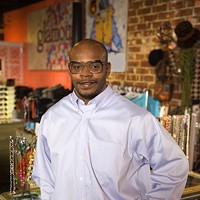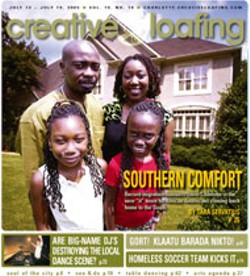The New Great Migration
Charlotte is now the No. 3 destination for African-Americans
it's my piece of the rock,
and I dig you, CC..."
— George Clinton, "Chocolate City," 1975
For Jatrine Bentsi-Enchill, it started pretty much the same way it has for everyone else. First, two physician friends of hers moved to Charlotte. They raved about what a great place it was for African-Americans, about how it wasn't topped out like Atlanta or New York, about how there was still opportunity here.
So Bentsi-Enchill, 41, and her husband packed up their things and moved from Los Angeles to a posh, 4,600-square-foot home in South Charlotte.
Bentsi-Enchill says she never imagined she'd end up living in the South. As a kid in New York City, nightmare stories of the things that happened to blacks in the South haunted her.
"I was terrified of the South growing up," she said. "If you had asked me 30 years ago if I would ever have decided to live here, I'd say you were out of your mind. My perspective has changed and I think the South has changed."
A few of her friends in California gave her a hard time about moving here.
"People were like, 'You're going where?'" said Bentsi-Enchill. "Aren't you afraid of the Klan or the cops and everything, and we'd say, 'Well, where did Rodney King get beaten?' It was right there in LA."
She and her husband, both lawyers, have built a great life for themselves here, she said. She recommends Charlotte highly to anyone who will listen — so highly, in fact, that her parents moved here and bought a house down the street from Bentsi-Enchill. A cousin soon followed. Then some friends. Then more friends.
They aren't alone. Since 1995, an estimated 61,000 blacks of all ages, education and income levels have moved to Mecklenburg County, according to US Census and Claritas data.
Just how big are those numbers? Big enough to make Charlotte the number three relocation destination in the country for African-Americans. By the end of the last decade, Charlotte had attracted more new African-Americans than all but two other US cities, Atlanta and Dallas, according to a 2004 study by the Brookings Institute, one of Washington, DC's oldest think tanks.
That was particularly surprising to Brookings' researchers. Atlanta and Dallas have been on the top ten list since the late 1970s, but Charlotte didn't show up on the list at all until 2000, when it shot to the number three spot.
The Charlotte area has quickly become one of the hottest destinations in what Brookings scholar William Frey calls "The New Great Migration," the large-scale migration of African-Americans back to their roots in the South.
Among African-Americans, many sa y, word is out that Charlotte is the "it" place to be.
"Everybody thinks of Charlotte as the new Atlanta," said Robin Brown, a housing counselor and administrator at the Urban League of Central Carolinas who moved here from Pittsburgh four years ago. "Everyone wants to come here."
None of this is news to Bill McCoy, the retired director of UNC Charlotte's Urban Institute. He says he's been following the new migration to Charlotte for about a decade.
"It is snowballing," said McCoy. "Obviously there has been a change in the demographic in Mecklenburg County. More people of color are locating here and they're locating in a much broader swath of Mecklenburg County than many people know or acknowledge or that has even occurred historically. When you look at current data, the only places where it continues to be primarily white are essentially above where I-485 is going to be in the north and maybe below Highway 51 in the south. In between those areas there are still places that are primarily white, but the complexion is changing."
The original Great Migration, one of the largest mass movements of people in American history, began around 1910, when African-Americans began trickling out of the South, heading north in search of jobs and a better racial climate, relatively speaking. By the middle of the century, the trickle had become a flood as African-Americans headed west to places like California. By 1970, nearly half of the country's black population had moved out of the South. Now, that trend is in full-scale reversal, said Frey. Between 1990 and 2000, the black population in the South increased by 3.6 million people, more than the other three regions of the country combined, he found.
Signs of this new migration are everywhere in Charlotte-Mecklenburg: in the schools, at the voting booth and in once solidly white neighborhoods that are now more diverse than ever. Yet, in Mecklenburg County, the trend has attracted little public notice, while the influx of Hispanics has grabbed big headlines.
That frustrates African-American civic activist Madine Fails, president of the Urban League of Central Carolinas. "I could tell it was happening about 10 years ago, and the reason I could tell was because there were a lot of people moving here that wanted to touch bases with the Urban League for the job opportunities or for the social amenities the community offered," Fails said. "What I noticed was that they were all Northerners who were either retiring and were moving to Charlotte or young professionals who were moving here for opportunity."
Fails said she's tried unsuccessfully to point out the trend to other city elites. A few years ago, she said, a guy from the Charlotte Chamber gave a presentation about the growth of the Hispanic community to a workforce development board she served on. Fails pointed out that large numbers of middle and upper-middle class blacks seemed to be moving here.
"The guy was so off base, he was so out of touch that he said, 'Oh yeah, yeah, because we don't want any race riots or anything,'" Fails said. "This migration is occurring, but I'm not sure that all of our corporate leaders are in step."
That's pretty typical of cities across the South that are fast becoming destinations in the new African American migration, said Robert E. Lang, director of the Metropolitan Institute at Virginia Tech. When Hispanics move in, it's big news, because not many Hispanics have lived here before, said Lang.
"If African-Americans have been there all along, nobody notices [the new ones]," he added.
Between 1990 and 2005, approximately 103,000 new African-Americans called the Charlotte area home. The Hispanic migration during that same period totaled about 60,000.
Though most experts say the real population numbers for Hispanics are likely much higher than the census count shows, the changing racial make-up in our schools also seems to indicate that the African-American migration is the bigger of the two. Since 1995, an additional 15,123 African-American children have enrolled in Charlotte-Mecklenburg Schools, compared to an additional 10,700 Hispanic children.
Why Charlotte?
By the mid-1990s, Herman McKinney had had enough of Los Angeles. The housing prices had gotten so ridiculous that he could no longer afford to buy the house he grew up in. He had young kids and wanted something better.
So he and his wife narrowed the choices to Dallas, Nashville or Charlotte. After friends showed him around the Queen City, he was hooked. McKinney, who is 40, says he was attracted here for the same reasons just about anyone else at his stage of life would be.
"The cost of housing, number one, and traffic and crime, two and three," said McKinney. The climate helped too, and that everything looked new and fresh to him.
The local economy didn't hurt. McKinney started a mortgage firm that largely serves an African-American clientele. His client base is big enough that he makes a good living, he said.
McKinney's case is typical of how group migrations begin, said Charles Gallagher, a professor with the Center for Neighborhood and Metropolitan Studies at Georgia State. Economic opportunity attracts the first wave of people, he said. Then friends and family follow. Eventually, the growing presence of a particular ethnic group in a place becomes a draw on its own.
"What we call it in the field is a chain migration," said Gallagher. "What happens is in a relatively short period of time, you see a population just explode."
To Leslie Truelove, the size and mix of Charlotte's African-American population is a big draw. "People want to move places where their families are going to be comfortable, where they can mix and mingle and meet people that are similar to them and have similar values," said Truelove. "You want to go somewhere where you can see people like you doing well."
Truelove already has a good job in Denver as a brand marketing manager for Coors, but she and her husband have started thinking about how they can make a move to Charlotte. With a new baby in the house, the couple wants to be closer to family. Her aunt, uncle and sister already live here, and her parents live in Chapel Hill.
Like most new migrants CL interviewed - many of whom have lived in much larger, more progressive cities - Truelove said she couldn't have imagined herself living here 10 years ago. But she thinks Charlotte has changed.
"When I go to visit, I'm amazed at how it seems a lot like other places I've lived," she said. "You have progressive people there, progressive thinking in terms of not only just race, but restaurants. It is a lot more contemporary now, a lot more 'bigger city.'"
Then there's what several people described as the subtle "signals" that Charlotte gives off that are catching the attention of African-Americans across the nation.
"It's the subliminal stuff about a place that black people tune into that white people probably don't even notice," said Chermaine Nichols, a single mother of three who shut down her small house-cleaning business in New York two years ago and is now rebuilding it here.
She had been leaning toward a move to Charlotte for a long time, she said, because of the things she'd been reading about the city in national black magazines. Like Nichols, many African-American migrants say the word about Charlotte really began to spread over the last decade, after the city made top-ten best-of lists in just about every major national black magazine; Charlotte ranked sixth in the nation on Black Enterprise's most recent list.
People Nichols knew who had moved here also talked about how minority friendly Charlotte's businesses climate seemed to be.
The Charlotte Chamber's Black Professionals Network, which has been around for about five years and has more than 1,700 members, helps connect young professionals with the Chamber's big league corporate honchos at diversity procurement conferences where companies looking to hire minorities and minority contractors can meet face to face. The Chamber also sponsors social mixers so African-American professionals can connect.
Nichols had heard about the Chamber's overtures to black professionals all the way back in New York. But that wasn't what finally convinced her to take a chance on Charlotte.
"It was Bob Johnson," she said. "When he chose to be in Charlotte, that was huge, a huge sign to African-Americans. Everyone I knew in New York who knows about Charlotte, they talked about that. We notice things like that. I thought, he's an entrepreneur and I'm an entrepreneur. He can go anywhere, but he wants to be in Charlotte. That really means something. So I thought maybe I can make it here, too."
Surprisingly, almost everyone interviewed for this story described Charlotte's racial climate, despite the busing lawsuit of the late 1990s, as better than the one they came from.
"One of the first things that really shocked me when we came to Charlotte is that we would be driving through fairly nice neighborhoods as black people, and that white residents in those communities greeted us," said Bentsi-Enchill. "My experience in New York, driving or riding my bike through predominantly white neighborhoods, was that I felt very unwelcome and almost unsafe and I just had this feeling that I didn't belong there.
"Do I think that race is still an issue here? Absolutely. My experience since I've been here is that it hasn't been as overt as in other places I've lived."
Speaking of News_.html, 5.00000
-
A Family Affair
Dec 12, 2007 -

Darrell Roach
Dec 12, 2007 -
Body Talk
Dec 12, 2007 - More »
Latest in Cover
Calendar
-

Wine & Paint @ Blackfinn Ameripub- Ballantyne
-

Face to Face Foundation Gala @ The Revelry North End
-
An Evening With Phil Rosenthal Of "Somebody Feed Phil" @ Knight Theater
-
Kountry Wayne: The King Of Hearts Tour @ Ovens Auditorium
-

Queen Charlotte Fair @ Route 29 Pavilion
-
Esports in Charlotte Takes Off: A Guide to Virtual Competitions and Betting
-
Canuck in the Queen City 7
A Canadian transplant looks back at her first year as a Charlotte resident
-
Homer's night on the town 41
If you drank a shot with the Knights mascot on Sept. 20, you were basically harboring a fugitive












